北师大版(2019)选择性必修第一册Unit 3 Conservation Lesson 3 The Road To Destruction 课件 (共26张PPT)
文档属性
| 名称 | 北师大版(2019)选择性必修第一册Unit 3 Conservation Lesson 3 The Road To Destruction 课件 (共26张PPT) |
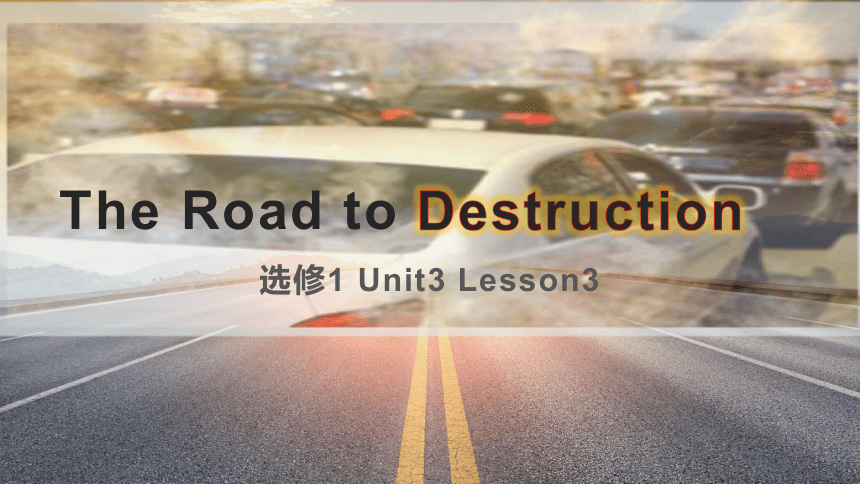
|
|
| 格式 | pptx | ||
| 文件大小 | 5.3MB | ||
| 资源类型 | 教案 | ||
| 版本资源 | 北师大版(2019) | ||
| 科目 | 英语 | ||
| 更新时间 | 2023-12-07 15:25:50 | ||
图片预览

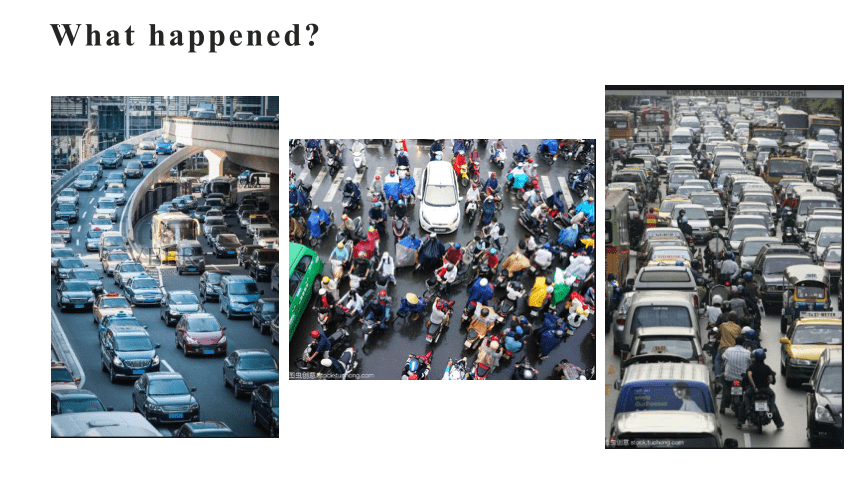
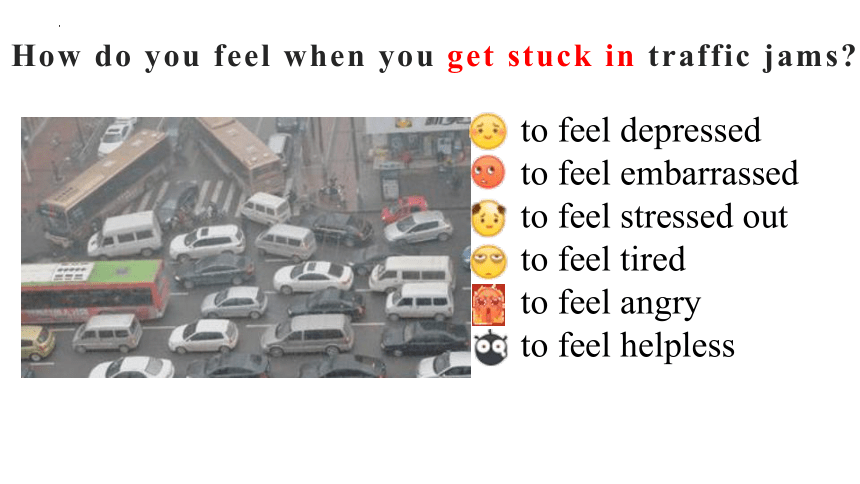
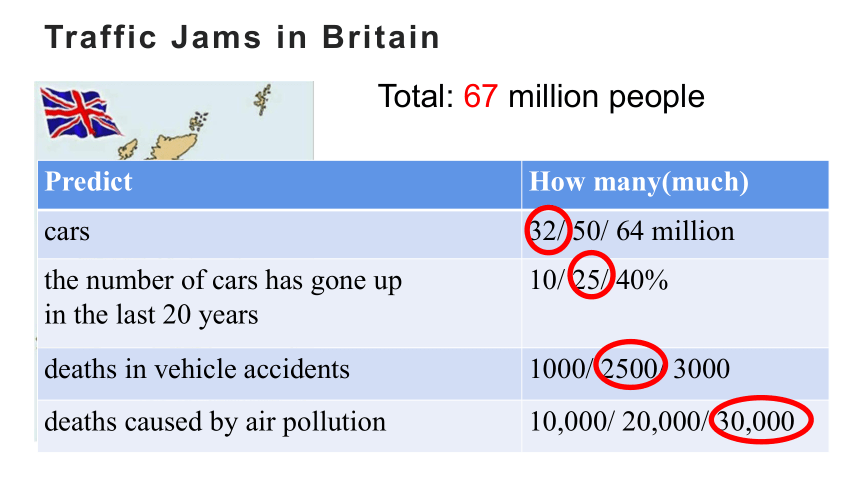

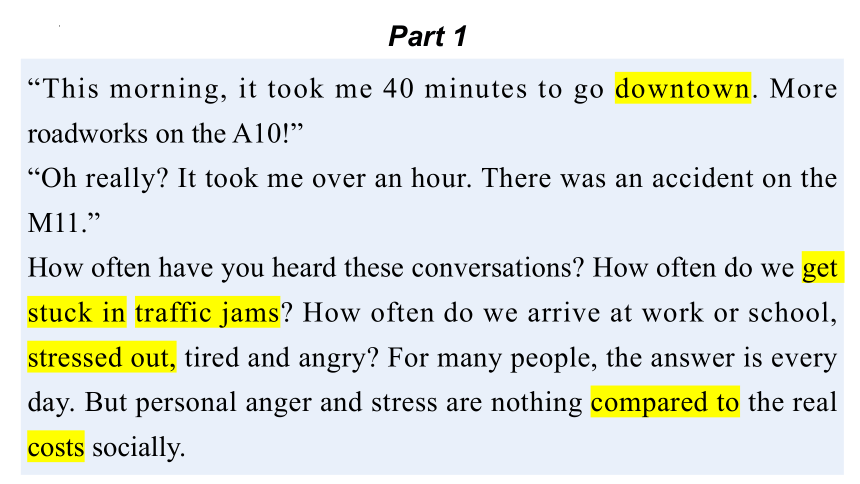
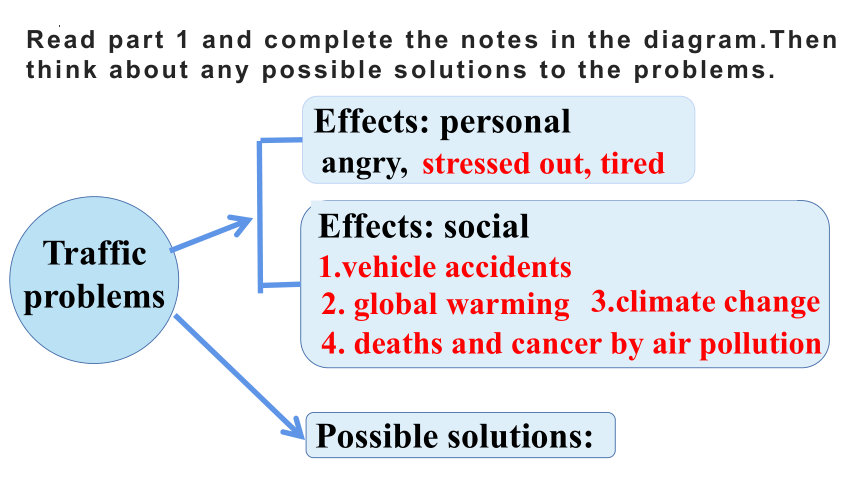
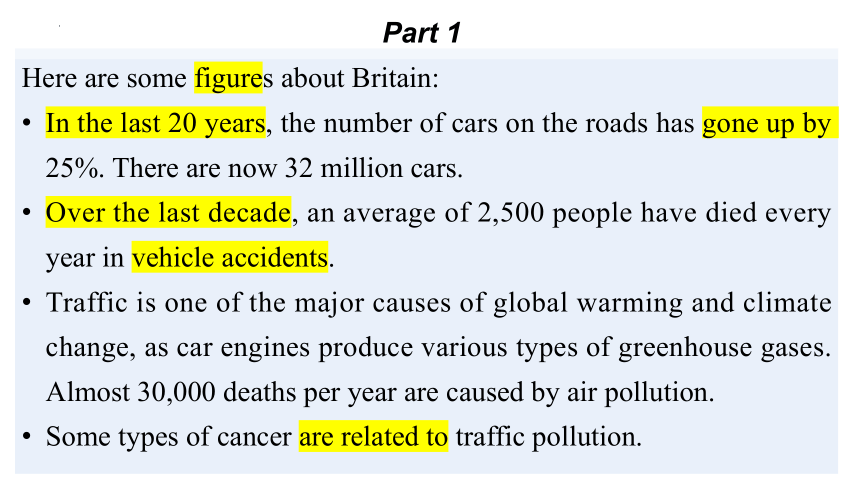
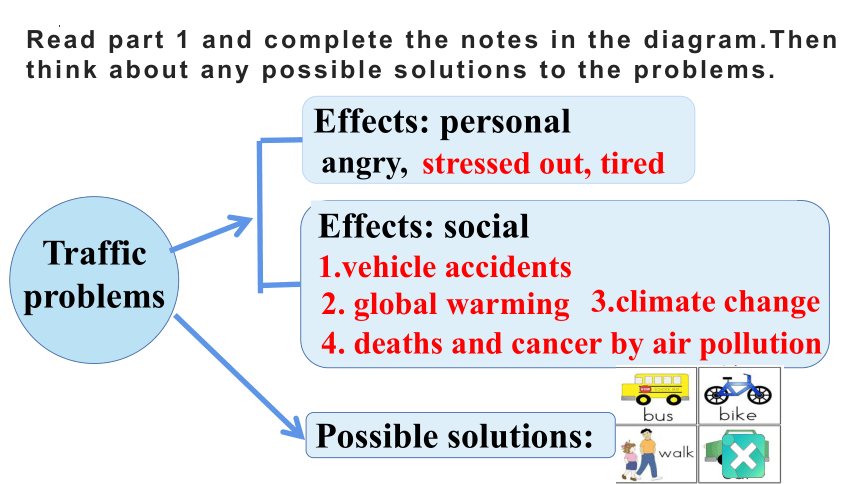
文档简介
(共26张PPT)
The Road to Destruction
选修1 Unit3 Lesson3
What happened
How do you feel when you get stuck in traffic jams
to feel depressed
to feel embarrassed
to feel stressed out
to feel tired
to feel angry
to feel helpless
Traffic Jams in Britain
Total: 67 million people
Predict How many(much)
cars 32/ 50/ 64 million
the number of cars has gone up in the last 20 years 10/ 25/ 40%
deaths in vehicle accidents 1000/ 2500/ 3000
deaths caused by air pollution 10,000/ 20,000/ 30,000
Read part 1 and complete the notes in the diagram.Then think about any possible solutions to the problems.
Traffic problems
Effects: social
Effects: personal
angry,
Possible solutions:
stressed out, tired
“This morning, it took me 40 minutes to go downtown. More roadworks on the A10!”
“Oh really It took me over an hour. There was an accident on the M11.”
How often have you heard these conversations How often do we get stuck in traffic jams How often do we arrive at work or school, stressed out, tired and angry For many people, the answer is every day. But personal anger and stress are nothing compared to the real costs socially.
Part 1
Read part 1 and complete the notes in the diagram.Then think about any possible solutions to the problems.
Traffic problems
Effects: social
Effects: personal
angry,
Possible solutions:
stressed out, tired
1.vehicle accidents
2. global warming
3.climate change
4. deaths and cancer by air pollution
Here are some figures about Britain:
In the last 20 years, the number of cars on the roads has gone up by 25%. There are now 32 million cars.
Over the last decade, an average of 2,500 people have died every year in vehicle accidents.
Traffic is one of the major causes of global warming and climate change, as car engines produce various types of greenhouse gases. Almost 30,000 deaths per year are caused by air pollution.
Some types of cancer are related to traffic pollution.
Part 1
Read part 1 and complete the notes in the diagram.Then think about any possible solutions to the problems.
Traffic problems
Effects: social
Effects: personal
angry,
Possible solutions:
stressed out, tired
1.vehicle accidents
2. global warming
3.climate change
4. deaths and cancer by air pollution
How many cars were there in Britain 20 years ago
12.6 million.
18.4 million .
C. 24 million.
D. 25.6 million .
Careful Reading
2. Which is the best title of Part 1
Effects of traffic in Britain.
How to avoid traffic jams
C. Diseases and air pollution.
D. The number of cars in Britain.
Careful Reading
Read Part 2 and answer questions:
What are the excuses that people make for using cars
Excuses:
“The buses are terrible.”
“The trains are always late.”
“I haven’t got time to walk.
“People are addicted to cars!”
We know that cars are bad for us. But we all make excuses: “The buses are terrible”; “The trains are always late”; “I haven’t got time to walk”. I’m talking about myself, too. To be frank, I’m addicted to my car. When I asked a friend working for a green-living organisation for advice about how to give up, she told me five things:
Part 2
Part 2 :
Solutions/Advice
Use public transport
Think before
you go
Share cars
Take action
Use your legs
Contrast / Comparison
Use your legs (short journey)
Use public transport
Think before you go
Share cars
Take action !
(Advantages: save money, keep fit, live longer, cut the risk of heart disease)
(Advantages: relax, read a book, talk to someone)
(Advantage: save time)
(Advantages: much cheaper, kinder to the environment)
(Examples: talk to your neighbours, write to the papers, go to the city government, ask for a speed limit...)
Advantages & Examples
cars VS walk or cycle
18 cars VS 1 bus
the other side of town VS the corner
oneself VS share with someone else
nothing VS something
Use your legs. In 2014, over 55% of car journeys were under eight kilometres. Instead of taking short car journeys, we could easily walk or cycle. Leg power can save your money, keep you fit and help you live longer. Regular exercise also cuts the risk of heart disease by 50%!
Use public transport. Up to 90 people can travel in one bus, while the same number will need at least 18 cars. Sometimes it can take a little bit longer, but so what You can relax, read a book, talk to someone—who knows
Part 2
Think before you go. Do you really have to go to that shopping centre on the other side of town What about the shops around the corner Before you get into your car, think about whether you really need to make that journey.
Share cars. If you really have to use a car, share journeys with someone else. It is much cheaper and kinder to the environment.
Part 2
Take action! We often think there is nothing we can do about the noise, pollution and danger of traffic. There is. If your street is full of heavy traffic, talk to your neighbours about it. Write to the papers. Go to the city government. Ask for a speed limit. Do whichever of these things that suit you. Don’t just sit around and complain!
Part 2
Read the last para in Part 2
1. What is the writer’s attitude towards cars Does he or she follow the five solutions
“All quite simple, isn’t it Five easy ways to improve our environment. Well, I’m sorry I have to finish this article,but I’ve got to pick up my daughter from school at 4 pm. Then I’ve got to drive to the supermarker to do the shopping. After that, I have to take my son to a party. The traffic is going to be horrible, but what can I do ”
set an example
×
Why
convenient, comfortable...
Group work
3. The writer’s opinion is supported by____.
A. conversations
B. examples
C. figures
D. explanations
Careful Reading
Careful Reading
4. What’s the writer’s attitude towards cars
A. He thinks they have more disadvantages than advantages.
B. He knows what he should do, but uses his car because it is convenient.
C. He thinks it would be easy for us all to use our cars less.
D. He thinks it not practical to use cars.
5. How do you understand the title The Road to Destruction
Too many cars destroy roads.
We should build enough roads to reduce traffic jams.
C. We shouldn’t use cars anymore in case of traffic problems.
D. The cars on the road will eventually lead to the destruction of our planet.
Careful Reading
Activity 8
Look at the Word Builder. Match the words (1-8) with the endings (a-h) to form common collocations. Then use the collocations to complete the summary.
1 make
2 get stuck
3 be
4 protect
5 do
6 pick
7 cause
8 share
a addicted to
b a lot of harm
c cars
d in a traffic jam
e up sb
f the environment
g excuses
h global warming
Word Builder
Exercise 8
Match the words (1-8) with the endings (a-h) to form
common collocations. Then use the collocations to
complete the summary.
make excuses get stuck in a traffic jam be addicted to protect the environment do a lot of harm pick up sb
cause global warming share cars
Many people often 1____________________ when they go to work. How annoyed and stressful th ey often feel! But the problem is that the number of cars is still going up. Traffic pollution has been found to 2____________________ and climate change to a large degree.Too many cars 3_________________ to the environment and our health. Some advice has been given for people to help 4_____________________, for example, using public transport or 5_____________, doing your shopping in the shop just around the corner instead of driving to the other side of town. However, people 6_________________using cars. They 7_______________for using their cars, “I need to 8_________my daughter. What can I do ”
get stuck in a traffic jam
cause global warming
do a lot of harm
protect the environment
sharing cars
are addicted to
make excuses
pick up
Word builder
Assignment: A “FOR” AND “AGAINST” ESSAY
Use the language you have learnt to write a “for” and “against” essay (100 words) on the use of vehicles. Then share it in groups.
The Road To Conservation
The Road to Destruction
选修1 Unit3 Lesson3
What happened
How do you feel when you get stuck in traffic jams
to feel depressed
to feel embarrassed
to feel stressed out
to feel tired
to feel angry
to feel helpless
Traffic Jams in Britain
Total: 67 million people
Predict How many(much)
cars 32/ 50/ 64 million
the number of cars has gone up in the last 20 years 10/ 25/ 40%
deaths in vehicle accidents 1000/ 2500/ 3000
deaths caused by air pollution 10,000/ 20,000/ 30,000
Read part 1 and complete the notes in the diagram.Then think about any possible solutions to the problems.
Traffic problems
Effects: social
Effects: personal
angry,
Possible solutions:
stressed out, tired
“This morning, it took me 40 minutes to go downtown. More roadworks on the A10!”
“Oh really It took me over an hour. There was an accident on the M11.”
How often have you heard these conversations How often do we get stuck in traffic jams How often do we arrive at work or school, stressed out, tired and angry For many people, the answer is every day. But personal anger and stress are nothing compared to the real costs socially.
Part 1
Read part 1 and complete the notes in the diagram.Then think about any possible solutions to the problems.
Traffic problems
Effects: social
Effects: personal
angry,
Possible solutions:
stressed out, tired
1.vehicle accidents
2. global warming
3.climate change
4. deaths and cancer by air pollution
Here are some figures about Britain:
In the last 20 years, the number of cars on the roads has gone up by 25%. There are now 32 million cars.
Over the last decade, an average of 2,500 people have died every year in vehicle accidents.
Traffic is one of the major causes of global warming and climate change, as car engines produce various types of greenhouse gases. Almost 30,000 deaths per year are caused by air pollution.
Some types of cancer are related to traffic pollution.
Part 1
Read part 1 and complete the notes in the diagram.Then think about any possible solutions to the problems.
Traffic problems
Effects: social
Effects: personal
angry,
Possible solutions:
stressed out, tired
1.vehicle accidents
2. global warming
3.climate change
4. deaths and cancer by air pollution
How many cars were there in Britain 20 years ago
12.6 million.
18.4 million .
C. 24 million.
D. 25.6 million .
Careful Reading
2. Which is the best title of Part 1
Effects of traffic in Britain.
How to avoid traffic jams
C. Diseases and air pollution.
D. The number of cars in Britain.
Careful Reading
Read Part 2 and answer questions:
What are the excuses that people make for using cars
Excuses:
“The buses are terrible.”
“The trains are always late.”
“I haven’t got time to walk.
“People are addicted to cars!”
We know that cars are bad for us. But we all make excuses: “The buses are terrible”; “The trains are always late”; “I haven’t got time to walk”. I’m talking about myself, too. To be frank, I’m addicted to my car. When I asked a friend working for a green-living organisation for advice about how to give up, she told me five things:
Part 2
Part 2 :
Solutions/Advice
Use public transport
Think before
you go
Share cars
Take action
Use your legs
Contrast / Comparison
Use your legs (short journey)
Use public transport
Think before you go
Share cars
Take action !
(Advantages: save money, keep fit, live longer, cut the risk of heart disease)
(Advantages: relax, read a book, talk to someone)
(Advantage: save time)
(Advantages: much cheaper, kinder to the environment)
(Examples: talk to your neighbours, write to the papers, go to the city government, ask for a speed limit...)
Advantages & Examples
cars VS walk or cycle
18 cars VS 1 bus
the other side of town VS the corner
oneself VS share with someone else
nothing VS something
Use your legs. In 2014, over 55% of car journeys were under eight kilometres. Instead of taking short car journeys, we could easily walk or cycle. Leg power can save your money, keep you fit and help you live longer. Regular exercise also cuts the risk of heart disease by 50%!
Use public transport. Up to 90 people can travel in one bus, while the same number will need at least 18 cars. Sometimes it can take a little bit longer, but so what You can relax, read a book, talk to someone—who knows
Part 2
Think before you go. Do you really have to go to that shopping centre on the other side of town What about the shops around the corner Before you get into your car, think about whether you really need to make that journey.
Share cars. If you really have to use a car, share journeys with someone else. It is much cheaper and kinder to the environment.
Part 2
Take action! We often think there is nothing we can do about the noise, pollution and danger of traffic. There is. If your street is full of heavy traffic, talk to your neighbours about it. Write to the papers. Go to the city government. Ask for a speed limit. Do whichever of these things that suit you. Don’t just sit around and complain!
Part 2
Read the last para in Part 2
1. What is the writer’s attitude towards cars Does he or she follow the five solutions
“All quite simple, isn’t it Five easy ways to improve our environment. Well, I’m sorry I have to finish this article,but I’ve got to pick up my daughter from school at 4 pm. Then I’ve got to drive to the supermarker to do the shopping. After that, I have to take my son to a party. The traffic is going to be horrible, but what can I do ”
set an example
×
Why
convenient, comfortable...
Group work
3. The writer’s opinion is supported by____.
A. conversations
B. examples
C. figures
D. explanations
Careful Reading
Careful Reading
4. What’s the writer’s attitude towards cars
A. He thinks they have more disadvantages than advantages.
B. He knows what he should do, but uses his car because it is convenient.
C. He thinks it would be easy for us all to use our cars less.
D. He thinks it not practical to use cars.
5. How do you understand the title The Road to Destruction
Too many cars destroy roads.
We should build enough roads to reduce traffic jams.
C. We shouldn’t use cars anymore in case of traffic problems.
D. The cars on the road will eventually lead to the destruction of our planet.
Careful Reading
Activity 8
Look at the Word Builder. Match the words (1-8) with the endings (a-h) to form common collocations. Then use the collocations to complete the summary.
1 make
2 get stuck
3 be
4 protect
5 do
6 pick
7 cause
8 share
a addicted to
b a lot of harm
c cars
d in a traffic jam
e up sb
f the environment
g excuses
h global warming
Word Builder
Exercise 8
Match the words (1-8) with the endings (a-h) to form
common collocations. Then use the collocations to
complete the summary.
make excuses get stuck in a traffic jam be addicted to protect the environment do a lot of harm pick up sb
cause global warming share cars
Many people often 1____________________ when they go to work. How annoyed and stressful th ey often feel! But the problem is that the number of cars is still going up. Traffic pollution has been found to 2____________________ and climate change to a large degree.Too many cars 3_________________ to the environment and our health. Some advice has been given for people to help 4_____________________, for example, using public transport or 5_____________, doing your shopping in the shop just around the corner instead of driving to the other side of town. However, people 6_________________using cars. They 7_______________for using their cars, “I need to 8_________my daughter. What can I do ”
get stuck in a traffic jam
cause global warming
do a lot of harm
protect the environment
sharing cars
are addicted to
make excuses
pick up
Word builder
Assignment: A “FOR” AND “AGAINST” ESSAY
Use the language you have learnt to write a “for” and “against” essay (100 words) on the use of vehicles. Then share it in groups.
The Road To Conservation
同课章节目录
- Unit 1 Relationshis
- Lesson 1 Teachers
- Lesson 2 How Do We Like Teachers’ Feedback?
- Lesson 3 So Close,Yet So Fa
- Unit 2 Success
- Lesson 1 Money vs Success
- Lesson 2 Top Five Secrets of Success
- Lesson 3 Getting to the Top
- Unit 3 Conservation
- Lesson 1 The Sixth Extinction
- Lesson 2 War on Plastic Packets
- Lesson 3 The Road to Destruction
